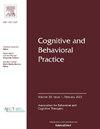Evaluation of Two Online Learning Courses for Evidence-Based Trauma Treatments: TFCBTWeb2.0 and CPTWeb2.0
IF 2.9
3区 心理学
Q1 PSYCHOLOGY, CLINICAL
引用次数: 0
Abstract
Web courses for evidence-based treatments (EBTs) are an important component of training models and broader treatment dissemination and implementation. However, there exists limited research on the efficacy of large-scale online training, as most studies exploring these trainings focus on web courses designed for a specific research project. This project explored participation and knowledge acquisition in two large-scale web courses for trauma-focused EBTs: TFCBTWeb2.0 and CPTWeb2.0. Data were extracted for 174,193 TFCBTWeb2.0 learners and 12,024 CPTWeb2.0 learners, including learner characteristics (e.g., degree, years of experience) and knowledge acquisition from course module pre- and posttest scores. Learners demonstrated significant increases in knowledge for all TFCBTWeb2.0 and CPTWeb2.0 modules. Examination of completion status (i.e., started vs. completed the course) indicated that learners who identified as trainees or early career professionals were more likely to complete a web course, compared to those with terminal degrees and 5+ years of experience. Learners who registered for TFCBTWeb2.0 prior to the COVID-19 pandemic also had slightly higher completion rates compared to peri-COVID-19 learners. Taken together, these findings suggest that web courses can be an effective tool for increasing EBT knowledge. Further, completion rates for both web courses suggest the potential importance of system-level factors (e.g., agency/supervisor support) to increase the likelihood of completing these types of trainings.
对两种基于证据的创伤治疗在线学习课程的评估:TFCBTWeb2.0 和 CPTWeb2.0
基于证据的治疗网络课程是培训模式和更广泛的治疗传播和实施的重要组成部分。然而,关于大规模在线培训效果的研究有限,因为大多数探索这些培训的研究都集中在为特定研究项目设计的网络课程上。本项目探讨了两门面向创伤型EBTs的大型网络课程:TFCBTWeb2.0和CPTWeb2.0的参与和知识获取。提取了174,193名TFCBTWeb2.0学习者和12,024名CPTWeb2.0学习者的数据,包括学习者特征(如学位、经验年限)和课程模块前测和后测成绩的知识获取情况。学习者对所有TFCBTWeb2.0和CPTWeb2.0模块的知识都有了显著的提高。完成状态的检查(即,开始和完成课程)表明,与那些拥有最终学位和5年以上经验的人相比,被认定为培训生或早期职业专业人士的学习者更有可能完成网络课程。在COVID-19大流行之前注册TFCBTWeb2.0的学习者的完成率也略高于COVID-19期间的学习者。综上所述,这些发现表明网络课程可以成为增加EBT知识的有效工具。此外,这两种网络课程的完成率表明,系统层面的因素(例如,机构/主管的支持)对于增加完成这类培训的可能性具有潜在的重要性。
本文章由计算机程序翻译,如有差异,请以英文原文为准。
求助全文
约1分钟内获得全文
求助全文
来源期刊

Cognitive and Behavioral Practice
PSYCHOLOGY, CLINICAL-
CiteScore
4.80
自引率
3.40%
发文量
118
审稿时长
84 days
期刊介绍:
Cognitive and Behavioral Practice is a quarterly international journal that serves an enduring resource for empirically informed methods of clinical practice. Its mission is to bridge the gap between published research and the actual clinical practice of cognitive behavior therapy. Cognitive and Behavioral Practice publishes clinically rich accounts of innovative assessment and diagnostic and therapeutic procedures that are clearly grounded in empirical research. A focus on application and implementation of procedures is maintained.
 求助内容:
求助内容: 应助结果提醒方式:
应助结果提醒方式:


